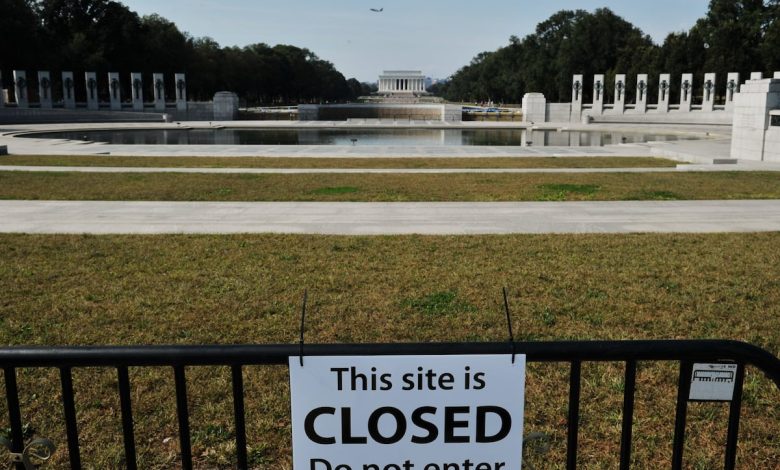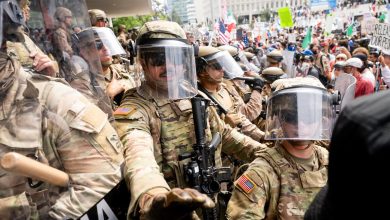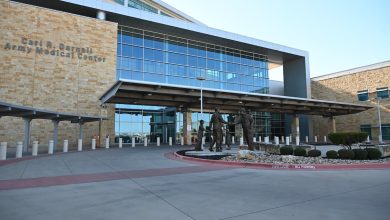Here’s how looming government shutdown could affect troops, families

A possible partial government shutdown next week could delay military paychecks and affect other programs and services for troops and families.
Meanwhile, House lawmakers are pushing for specific legislation to guarantee military pay during government shutdowns.
If the House and Senate don’t approve a short term extension of funding levels by Sept. 30, it could force a partial shutdown of most government activities on Oct. 1, until lawmakers can reach a new funding agreement.
Lawmakers are at a stalemate, and are out of town this week. Senators are scheduled to return Sept. 29. On Tuesday, President Donald Trump canceled a meeting scheduled for this week with House and Senate Democrat leaders.
A shutdown “will only hurt the most vulnerable in our country, our seniors, our veterans, our military families and increasing security for members of Congress, which is something this White House and the administration supports,” said White House Press Secretary Karoline Leavitt, during a Sept. 22 briefing with reporters.
At publication time, no new guidance for operations during a shutdown had been issued by the Office of Management and Budget or by defense officials, and information was not available from OMB or DOD about when that guidance might happen.
But based on previous guidance, we’ve compiled some general information about what might and what might not continue to operate.
There’s no guarantee that current guidance will mirror past recommendations. Stay tuned for more information.
Military personnel
Active-duty troops, including reserve component personnel on federal active duty would be required to continue to report for duty in the event of a shutdown, but their paychecks would stop until a new funding deal is reached, based on previous guidance. Military retirees and annuitants would continue to receive their pay, which is funded from a different source.
Rep. Jen Kiggans, R-Va., has introduced legislation to ensure that troops, including the Coast Guard, would continue receiving pay and benefits in the event of a government shutdown. That authority would continue until regular appropriations are passed into law, or until Jan. 1, 2027. To date, 56 lawmakers have signed on to support the proposed Pay Our Troops Act of 2026. The bipartisan push also would guarantee pay and allowances for civilian personnel at the Department of Defense and Department of Homeland Security who directly support service members and contractors providing mission-essential support to service members.
A shutdown could also delay some specialty pays and stipends.
Certain DOD programs and activities may be excepted from being shut down, based on national security requirements to be determined. One example in the last guidance was activities in direct support of military operations and activities, including those forces assigned to combatant commands.
The shutdown could also limit permanent change of station moves for military personnel. Previously, moves were primarily limited to troops moving to an excepted activity — activities granted an exemption from the shutdown.
RELATED
Civilian defense workers
Unlike troops, not all civilian defense staffers would be required to keep working in the event of a shutdown. DOD Civilian personnel who aren’t necessary to carry out or support excepted activities are furloughed; only the minimum number of civilian employees necessary to carry out those activities would be excepted from furlough.
Previously, some DOD civilians were required to work without pay; others continued to work and get paid because they weren’t paid by annual appropriations. Government employees are guaranteed back pay after the shutdown ends, but the situation still causes uncertainty and financial hardship in some cases.
This also affects thousands of military spouses who work as civilians for many government agencies.
Military medical
Previously, inpatient care in DOD medical treatment facilities was excepted from shutdown. Critical medical and dental outpatient care was excepted in medical and dental facilities. Elective surgery and other elective procedures were not excepted, and could be postponed or cancelled during a shutdown.
Private sector health care under Tricare would not be affected by a shutdown, and specialty medical care for wounded warriors would continue. But office hours could be curtailed because of staffing issues.
Child care and MWR
In the past, Defense Department officials have said child care would be decided base-by-base, depending on installation staffing and demands. Families may not know if their DOD child care facility will remain open until a shutdown happens.
Department guidance during previous shutdown threats has also specified that morale, welfare and recreation activities that receive any taxpayer funding will operate during a shutdown if they are deemed necessary to support essential operations. That includes mess halls, physical training and “child care activities required for readiness.”
Non-essential activities could be shuttered.
Activities and organizations funded entirely by non-appropriated funds, such as many MWR activities and the military exchanges, generally will not be affected. The exchanges are largely funded by sales revenue, not taxpayer dollars, and part of their profits go to help fund some MWR activities.
DOD schools
Previously, schools around the world operated by the Department of Defense Education Activity have been allowed to continue educating children during a shutdown. However, sporting events and extracurricular activities, including sports practices, weren’t excepted and could only continue if they were fully funded by non-appropriated funds.
Commissaries
Military grocery stores should not be affected unless the shutdown lasts several months. Defense Working Capital Fund activities — which includes the Defense Commissary Agency — were previously allowed to continue to operate until cash reserves were exhausted. For commissaries, that would be about 60 days, unless cash reserves run out before then.
Defense officials have also previously provided exceptions for the 58 overseas commissaries, including Puerto Rico and Guam, to stay open, and sites “determined to be in remote U.S. locations where no other sources of food are reasonably available for military personnel.” According to the American Logistics Association, those identified as remote are Marine Corps Mountain Warfare Training Center, Bridgeport, California; Coast Guard Base Kodiak, Alaska; Fort Greely, Alaska; and Dugway Proving Grounds, Utah. Those commissaries with exceptions must continue to operate even after working capital fund cash reserves are exhausted.
Veterans Affairs operations
Unlike the Defense Department, most Veterans Affairs offices are funded a year in advance. Benefits processing, medical centers and other support services will continue operating amid a partial shutdown.
Hours and appointment availability could be changed because of the budget impasse, but VA hospitals will remain open and operational.
Some department information hotlines could be shuttered during a shutdown, and some VA central office staff would be furloughed until new funding is approved. But compared to other departments, the impact on overall VA operations would be minimal.
We’ve covered just a few of the general impacts here. If a shutdown happens, stay tuned to your installation officials about specific effects.
Karen has covered military families, quality of life and consumer issues for Military Times for more than 30 years, and is co-author of a chapter on media coverage of military families in the book “A Battle Plan for Supporting Military Families.” She previously worked for newspapers in Guam, Norfolk, Jacksonville, Fla., and Athens, Ga.
Read the full article here









